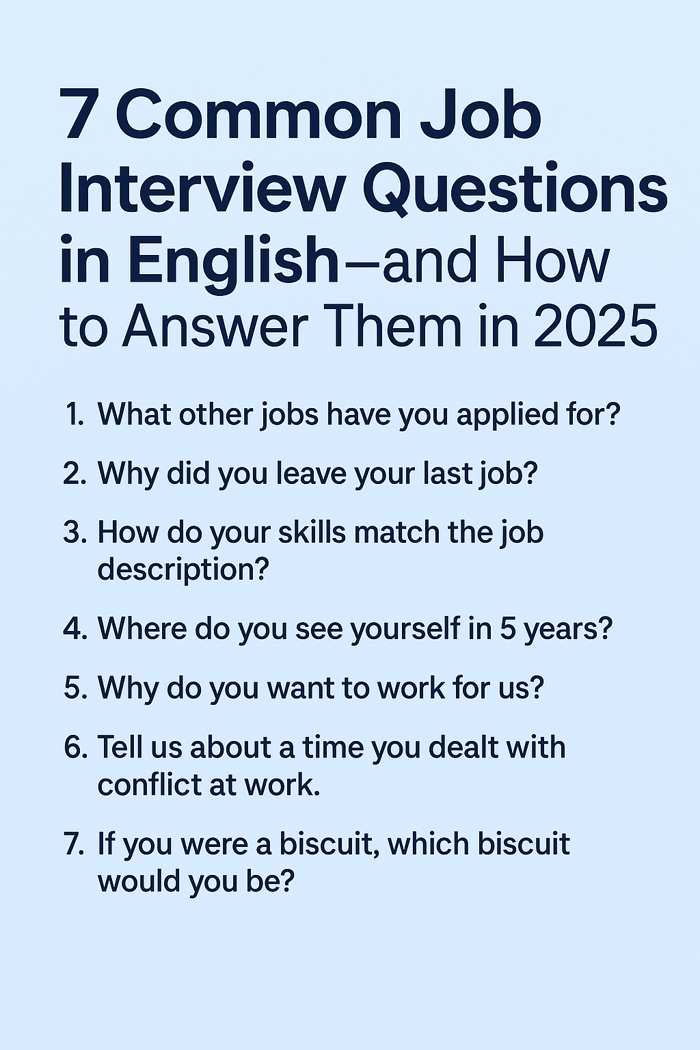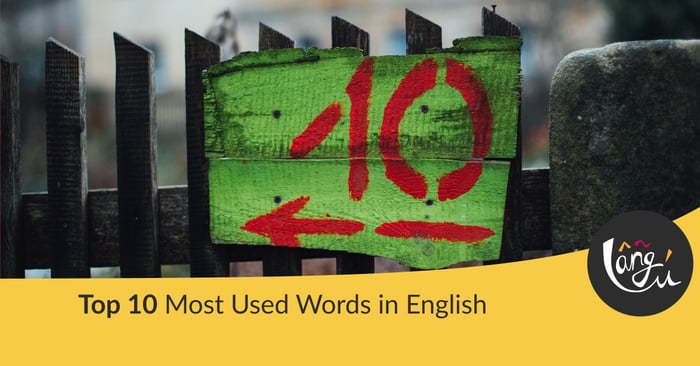Feeling nervous before a job interview? Totally normal. Everyone wants to make a great impression and land the role — and it’s even more nerve-wracking if the interview is in English and you’re not 100% confident in your language skills.
The good news? With some preparation and practice, you can turn your nerves into confidence. Below are 7 of the most common job interview questions in English — along with tips on how to answer them clearly, professionally, and naturally.

1. What other jobs have you applied for?
This might sound like a simple question, but it’s really about focus and self-awareness. Employers want to know whether you're clear about your career path — not just applying randomly to anything that’s available.
If you’ve applied for very different roles, choose 2–3 that are most relevant to the one you’re interviewing for, and explain the common thread that connects them.
✅ Pro tip: Avoid mentioning jobs that are wildly different in industry or skill set.
Example:
“In addition to this role, I’ve applied for two other marketing positions — one at a cosmetics brand and one at a B2B SaaS company. What they all have in common is a strong focus on digital strategy and client communication, which matches my experience and interests.”
2. Why did you leave your last job?
This question is tricky — especially in English — because you need to balance honesty with professionalism.
Even if your last job wasn’t great, avoid sounding bitter or negative. Focus on what you’re looking for going forward, not what went wrong.
If the issue was the work environment, you might say it wasn’t the right fit. If it was the workload, compensation, or company direction, be polite but clear.
Example:
“There were several management changes recently, and the direction of the company shifted. I’m now looking for a more stable environment with room to grow professionally.”
3. How do your skills match the job description?
This is your chance to show you’ve done your homework. Go beyond repeating your CV — demonstrate that you understand what the job involves, and how your experience fits the role.
✅ Mention specific tools, tasks, or areas of knowledge listed in the job ad.
✅ Show both hard skills and soft skills like teamwork, adaptability, or creativity.
✅ Link your personality to the company culture if you can.
Example:
“This role focuses on lead generation and content strategy — both of which I’ve worked on for over a year. I’m also a creative thinker and a strong communicator, which helps when designing lead magnets and collaborating with sales teams.”
4. Where do you see yourself in 5 years?
This classic question is about ambition and alignment. Employers want to know that you’re committed and have goals that fit the company’s growth.
Don’t try to impress them with a dream title. Instead, show that you’re thinking about learning, contributing, and growing in realistic ways.
Example:
“In five years, I see myself working in a more senior marketing role — ideally still with the same company. I want to continue developing my strategy and leadership skills so I can contribute to bigger campaigns and mentor others.”
5. Why do you want to work here?
This one can make or break the interview. It shows whether you’ve actually thought about why this company — not just why any job.
✅ Mention something unique about the company — their mission, product, team, culture, or reputation.
✅ Show how your interests align with theirs.
Example:
“I’ve always had a personal interest in skincare and sustainability, and I know your brand is a leader in eco-friendly beauty. I love the idea of combining my marketing skills with a mission I really believe in.”
6. Tell us about a time you dealt with conflict at work.
Situational questions are very common in 2025. Interviewers want to see how you respond to real challenges — not just how you talk about your strengths.
Use the STAR technique:
Situation
Task
Action
Result
And always focus on what you learned or how you grew from the situation.
Example:
“When I was an intern in a software company, I was overly chatty at work — I thought it would help me connect with the team. My team leader gave me respectful feedback and helped me understand the team’s need for quiet focus. I really appreciated that and adjusted my communication style. It helped me grow professionally and personally.”
7. If you were a biscuit, which biscuit would you be?
Yes, companies are still asking quirky questions like this — especially in tech, creative fields, and startup environments. They’re not looking for the “right” answer — they want to see how you think, and whether you can stay relaxed and creative under pressure.
✅ Keep it fun, but thoughtful.
✅ Choose a quality about the biscuit that connects to your personality or work style.
Example:
“I’d say I’m like a punch cake — I may seem simple on the outside, but I have a lot of unexpected layers and qualities that come out over time. I’m reliable, a bit quirky, and people tend to remember me.”
Need help preparing?
If you’ve got an interview coming up — especially in English — don’t go it alone. Our Business English teachers on Langu can help you:
Polish your answers
Practice common questions
Improve fluency and confidence
Sound natural and professional in real-time conversations
Book a session and walk into your next interview with confidence! Practise Interview Questions with an English Teacher




